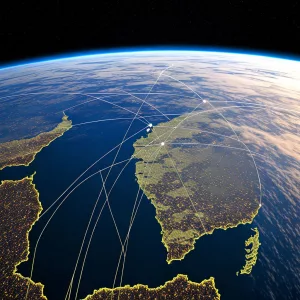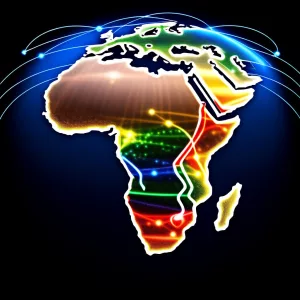South Africa is gearing up for an exciting electric vehicle (EV) future as Toyota and Volkswagen plan to launch locally assembled EVs in 2026. Thanks to government incentives and local manufacturing, these cars will be more affordable and easier to own than ever before. This shift means cleaner air, new jobs, and a fresh start for the country’s car industry. Though challenges like power supply and charging stations remain, South Africans are ready to embrace this new, greener way to drive.
Coding bootcamps in South Africa are giving young people a new chance by teaching them digital skills quickly and affordably. These programs focus on handson learning and real projects, helping youth overcome barriers to jobs in tech. With support from mentors and local businesses, many students are finding work and hope in a digital future. Despite ongoing challenges like poor internet access, these bootcamps are sparking change and opening doors for South Africa’s youth to build brighter lives.
The South African Women in Science Awards (SAWISA) celebrate 20 years of honoring women who have changed the face of science in South Africa. This special event shines a bright light on women’s achievements, from research breakthroughs to leadership roles, inspiring future generations. Over the years, more women have stepped into labs and classrooms, breaking barriers and reshaping the scientific world. Yet, the journey continues as more effort is needed to reach true equality, especially in top leadership. SAWISA is not just an awards night it’s a powerful movement lifting women up and lighting the path for those who will follow.
IRIS is a smart teaching robot created to help kids in South Africa learn better, especially in rural schools that don’t have many teachers or resources. Designed by Bonisile, a young woman from a small town, IRIS gives lessons that fit each child’s pace and gives instant feedback. This robot not only makes learning more fun and fair but also shows how technology can open doors for girls and young people everywhere. South Africa hopes IRIS will change classrooms and inspire a brighter future for all children.
The Xpress Trolley is South Africa’s first smart shopping cart, changing how people shop at Checkers stores. It has a touchscreen and barcode scanner that help shoppers find products, scan items as they go, and pay right on the trolley so no more long checkout lines! This new technology makes shopping faster, easier, and more personal, guiding customers through the store with special deals and maps. It’s a fresh way to shop that mixes modern tech with everyday life, making grocery trips simple and fun for everyone.
The Faure New Water Scheme is a bold new project in Cape Town that turns treated wastewater into clean, safe drinking water using advanced technology. It will add up to 70 million litres of recycled water every day, helping the city fight water shortages and protect the environment. The city invites everyone to join the conversation, making sure the community’s voice shapes this important plan. Together, Cape Town is finding smart, creative ways to secure its water future for all.
Eskom, South Africa’s main power company, is changing how energy is made by bringing in lots of solar and wind power. Big factories can now buy clean solar energy directly, helping cut down on dirty coal use and pollution. Eskom plans to add 2 gigawatts of renewables by 2026 and aims for 32 gigawatts by 2040, hoping to make power cleaner, steadier, and better for the planet. This big switch could help end blackouts and create new jobs as the country moves toward a brighter, greener future.
Starlink, SpaceX’s satellite internet, promises to bring fast and affordable internet to South Africa’s rural and underserved areas, helping bridge the digital divide. However, strict local rules, especially about ownership by historically disadvantaged groups, make it tricky for Starlink to launch smoothly. The company wants more flexible ways to support South Africa’s empowerment goals, like investing in education and local businesses, rather than just handing over shares. How the government balances these rules and innovation will shape South Africa’s digital future, with big effects on access, opportunity, and growth across the country.
Scientists at Stellenbosch University have uncovered 79 special natural chemicals in Cannabis leaves, including 25 brandnew ones never seen before. Among these are rare flavoalkaloids, unique molecules that might help fight inflammation and protect cells. This exciting discovery shows that Cannabis holds much more than just THC and CBD, offering fresh hope for new medicines from parts of the plant usually thrown away. The research opens a bright new chapter in understanding this ancient plant’s hidden powers.
Starlink promises to bring fast satellite internet to Africa, sparking hope for better connections in remote areas. But high costs, tricky rules like South Africa’s ownership laws and spotty service have made the journey tough. In Kenya, many found Starlink too expensive and unreliable, while in South Africa, strict regulations blocked official access, pushing some users to risky workarounds. Despite these hurdles, the strong demand for better internet shows that Starlink’s dream is still alive, needing smart local solutions to truly succeed.
The Ndebele Tribe LEGO Hut is a colorful LEGO set created by Lindsay Swartbooi that brings the bright, bold art of South Africa’s Ndebele people to life. It lets builders explore the tribe’s special designs and stories by making their own patterns on the hut’s walls. This playful set not only honors a rich cultural tradition but also invites people everywhere to learn, imagine, and celebrate a living heritage. Through this creative journey, the Ndebele story shines brightly in the hands of everyone who builds it.
AI influencers like Mia and Ana Zelu are digital stars created by smart computer programs, shining with perfect beauty and endless charm. They never age or slip up, making them ideal for brands who want flawless marketing. These virtual sisters share stylish, dreamlike photos from around the world, blending fantasy and reality in ways that captivate hundreds of thousands of followers. While their digital perfection fascinates many, it also raises questions about how real people feel about beauty and success. As AI influencers grow, they are changing how we see friendship, fame, and what’s truly authentic online.
The LimpopoGauteng bullet train is South Africa’s first highspeed train, set to connect Pretoria to Musina and cut travel time from over five hours to just 90 minutes. This fast, modern train will link cities and towns, boost trade, create jobs, and bring new opportunities to many people. Though building it faces challenges like protecting nature and funding, the project shines as a bright symbol of hope, progress, and unity for the country’s future. South Africans are excited to see this dream turn into a speedy reality that can change lives.
South Africa is working hard to bring its public services into the digital age by upgrading technology and teaching staff new digital skills. The goal is to make government work faster, fairer, and more open to the people. While some areas still struggle with old systems and slow internet, others are shining examples of progress, like digital birth registrations and mobile apps for social grants. This digital push is seen as a fresh start—like a creative wave—that can connect citizens and build a stronger future for the whole country.
Online casino gaming is booming in South Africa because it’s easy, fun, and social. People can play exciting games anytime on their phones without needing to dress up or travel to big casinos. The games often feature beautiful designs inspired by local culture, making playing feel special and familiar. This new way of gaming brings people together from cities and villages alike, creating lively digital communities where friends meet, chat, and share the thrill of winning. It’s a fresh, colorful world of fun that fits right into everyday life.
Career Agent is an easytouse AI tool that helps African job seekers find and apply for jobs faster by matching their CVs to listings and sending applications for them. Created by Thabo Maibi at Stellenbosch University, this smart platform also offers a voiceactivated CV builder and checks how well CVs pass job filters. By working quietly in the background, Career Agent frees people from endless searching, making the job hunt simpler and more hopeful for many across Africa.
















